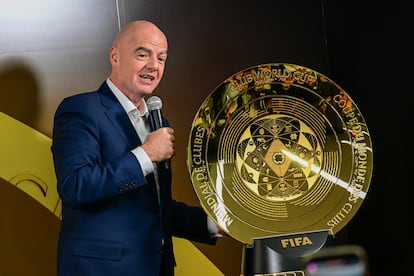World Cup: football against itself

Text in which the author advocates ideas and draws conclusions based on his or her interpretation of facts and data

It will be in the United States where FIFA will expand its new circus tent: it's called Mundialito . We'll be watching it on DAZN thanks to a premium paid by Saudi Arabia. Such generosity is worth a World Cup. This introduction speaks to the new global order being built around the ball. A new map of power is being mapped. Money rules, and it leaves us with the perception that football is growing, but its soul is suffering because its roots are weakening. More than a declaration of intent, the Mundialito reveals a declaration of interests.
An uneven tournament, because the gap between the European giants and the teams representing other continents is abysmal. Even with South America, which thrives on national teams because many players hone their competitiveness in European teams, but not in clubs, where those who lack the talent to cross the pond play . From here on, the unknown is the main narrative driving force of the circus. It makes you want to ask: Did anyone think about the fans ? Some matches are attractive and others are unpalatable, but don't leave your seat because in the end, the best will fight for glory, which is what we call reputation. Thus, we fall into the emotional trap that football handles so well.
Here's the facts: it's being held in 11 cities, most of which won't even notice there's a match on that day, from June 14 to July 13. On the eve of the real World Cup, the inappropriateness is evident, to the point that it's easy to mistake the tournament for a commercial tour that entitles you to $1 billion in prize money to be shared. Who can say no? But we love football because it's an incomparable storyteller, and this staging is weak on all fronts.
Shoehorning a tournament of this magnitude into the world calendar puts the health of both players and competitions at risk. The statistics speak for themselves about the former: muscle injuries have increased by 25% since 2020. Common sense speaks for the latter: the more tired the team, the less spectacle. Despite extreme care, there's no time left to train, rest, or take care of one's mental health. Just play, travel, and perform.
Herein lies the great paradox of modern football. A kind of silent pact that makes us all complicit in the commercial drift. A scenario of exploitation where the exploited applaud. Yes, the most exploited of the system (the players) are, at the same time, the greatest beneficiaries. Players who play 60 or 70 matches a year, who endure transoceanic flights, advertising sessions, pressures, physical and psychological demands… There's no respite, but many earn more than they could have ever dreamed of. They complain little because the inflation of the system takes care of their privileges . No one is interested in breaking the spell as long as the show keeps making money.
The Mundialito, like other recent inventions, is just another chapter in the economic appetite that pits football against itself. The tragedy is that there are no clear villains to set off the alarm bells. Clubs want more revenue, players more millions, and we fans continue to consume what we criticize because the game still smells of childhood. With its corresponding innocence. The problem is that by losing sight of emotion and identity, football begins to become a simulation of itself.
The World Cup isn't the root of the problem, but it is the latest reflection of the contradictions affecting football. A tournament for profit, where everyone will make money, except for the fans, the only disinterested ones who are flooded with matches, but who have fewer and fewer authentic emotions to celebrate every day.

Jorge Valdano is a columnist for EL PAÍS and a Mediapro commentator for Movistar. A former soccer player, he won a World Cup with Argentina in 1986 and was also a coach. He held two positions as sporting director and general manager of Real Madrid, where he was also a player and coach. He has written several books.
EL PAÍS





